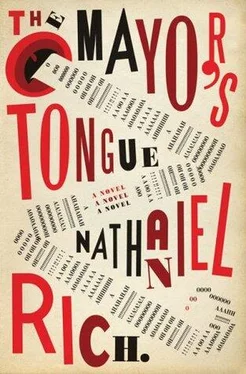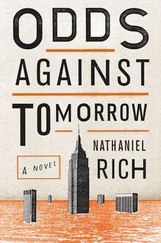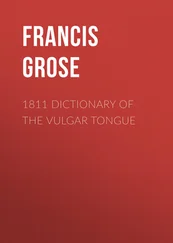"From the congregation competing for my attention I pulled aside someone I knew I could trust: Conroy Eaker, the protagonist of my autobiographical first novel. He was too much like me to deceive me. What he told me disturbed me so greatly that I had to sit down in the mud.
"He said that everyone in the camp had been there as long as they could remember. The people here never grew old, but stayed frozen at the same age. They never slept, they ate juniper berries and wild heather, and they drank from the streams in the valley— dropping their heads into the water like pigs at a trough. Many believed that they were in some sort of afterlife, because they each had faint memories of a previous existence. Several others had gone completely mad and a few — the most depressive of the bunch — had jumped over the cliff into the sea. Only as soon as they hit the water, they would find themselves on the ground back in the middle of the town, lying down peacefully as if they were just awakening from a nap. (Several of the more adventurous citizens started to jump over the cliff as sport, confident in the knowledge that upon contact with the sea, they'd be restored intact to the town. But they got tired of that after a while, and the townspeople now only tossed one another over as a practical joke. Especially the newcomers.) Then there were a brave few — the detective Jaymes Silk led the charge — who tried to escape by hiking over the mountains. But as soon as they walked across the edge of the valley and into the mountains, they would pass seamlessly right back into the Idaville mudflat.
"Newcomers would appear in town, materializing overnight, once every six months or so. They would be oblivious and confused, having only fleeting memories of the world from which they had come. While some old-timers would toss them over the cliff for fun, others tried to console them. No one, however, could offer them an explanation, because no one knew where they had come from, and when they might be able to return, if ever.
"There had been rumors, though, of a godhead, wandering the heavens in search of them, for all of time. A creator who would appear one day and care for them. When I showed up — the only man to walk into the town from the valley, and not to materialize in the middle of town — they knew that I was the divinity they had prayed for. In my voice they recognized the source of all their speech. They spoke in a universal tongue of my own creation.
"I resisted, of course. I had a life back home, in Paris. And in New York, and Prague and New Orleans and San Francisco and London. I had lives — and families — in all those places. And women in many, many more. But it's true that I had lost interest in those lives, and those women. I'm a creature of experience and adventure. And nothing on earth could equal this experience. I could still write here — I would write better, in fact, since I would be in complete isolation, without any company except my own creations. I'd stay here because it is like a native country for me. All of my life is here. I thought, If this isn't heaven, then I don't want to go there.
"So I answered their prayers. I taught them to hunt and gather and chop trees for houses. I planned this town. The houses, all identical, match the one in which I was raised — in St. Rose, Louisiana — though these are well maintained and not dilapidated. And the women: they came to me willingly."
"Is. . Bonnie here? From Love in Pittsburgh ?"
"She's here. And her schoolmates Dara, Lisa, and Phlox. The sisters Dobbs and the twin Janets and even poor fat Betsy Loraine — you'd have to roll her around in flour to find her wet spot. Keftir's nurses. A gaggle of strippers, dyspeptic housewives.
And most of all, the whores — I hadn't realized how dominant this motif had been in my work — the whores Daisy, Gorazda, Sasha Z., Laura Burns, Aqua-Girl. . let's see. . Julip the Wizardess and Kai the Pink Blossom Warrior Temptress—"
"All of them, in other words."
"Yes." Eakins smiled, inhaling deeply. "All of them. Also Allie Apples and Lemony Lil. Can you believe it?"
"Yes," lied Eugene.
"I built this town for all of them — my children — so they didn't have to live in the mud. And they called me the Mayor. I hiked to Duino and brought back for them tools and supplies and books. My books. I read them to my children and they learned the myths of their creation. Imagine their surprise when they discovered they were characters in their own bibles. But of course it couldn't have been any other way.
"To some of them, I gave an even greater gift: I allowed them — a select few, granted — to leave town. And some did. Most of them rushed back right away, terrified of the outside world. They felt as if they had been cast out of the Garden. Or they feared old age, and disease, and other misfortunes of life beyond Idaville. Or, like Enzo, they came back for love. I send others out, from time to time, to report on the world to me. One of them is the drunk, Bazlen, who is especially effective since no one except for me can understand what he's saying. In the real world he is shunned and ignored.
"Some of my children, however, never return. Frank Lang is one of them. A bit character from a murder mystery I wrote under a pseudonym, Murder in the Mojave . Those like Frank have their reasons and their pride. Out of my beneficence, I let them go. I take as a compliment their ability to pass for real. It means I've succeeded. Of course if they don't come back, they lose all the privileges and charms of Idaville."
Eugene felt something close and dark rise like smoke in his heart. He couldn't follow where this madman's tirade was going, but seeing the bulge of the gun in Eakins's bathrobe pocket, he knew he would have to wait it out. Eakins was likely insane, but how then could Eugene account for the mansion, or the town in the middle of nowhere? Or the slavish townspeople, living in abject awe of Eakins, their Mayor?
"Now let's take a better look at this manuscript," said Eakins. He leafed through Alvaro's manuscript and then Eugene's, slowing to read a paragraph here and there.
"Not terrible."
"That's kind of you," said Eugene, "but as I said before, the book was written by a friend, Alvaro. I'm sure he'llbe happy to hear your compliments."
Eakins gave him a baffled look.
"I don't think you understand."
"Why?"
"You already admitted you can't read Cibaeño."
"Yes, but I get the gist," said Eugene, less sure of himself. He felt uncomfortable articulating these things out loud. "I'm very close to finishing. I get the gist."
He gave Eakins a brief plot summary, and the author laughed, his voice a loud, reverberant trombone.
"As it so happens," said Eakins, "I know how to speak Cibaeño. If you had read my collection of essays on the Caribbean, you would have known that I spent two winters on Hispaniola in the late fifties with a Cibaeño girlfriend and her family. I speak that pidgin tongue fluently. Your friend's story has nothing to do with shinefish, or an apartment building in Inwood, or a surgeon priest named Jacinto and his adventures with his true love, Alsa, in Cibao. It's a letter from your friend, Alvaro, to his wife. He wants a divorce."
"A divorce?"
"A divorce, no more or less. He's begging for forgiveness for his infidelities, and asking for partial custody of his children. The stories, those ridiculous stories, are yours alone."
Eakins gave Eugene a broad, venomous grin. They had come full circle around the field. The waves were quiet in the distance and the horizon had dimmed to a dull magenta.
"Why don't you come back to the house? It's time for dessert, and I'm starving."
Was Eakins right? Eugene had followed what he thought Alvaro had in mind, and written it down. He realized, of course, that he was taking some artistic license — it would be impossible to replicate in English exactly what Alvaro had written. But he felt confident that he had captured the essence of the text, that he had faithfully performed the task of the translator. It was more than confidence, in fact; deep in his blood, he knew he was writing the truth. The thought that he had subverted the manuscript entirely and had made up everything— The guilt hammered at his gut. He had been disloyal to his friend. What shameless gobbledygook had he scrawled across those pages?
Читать дальше












